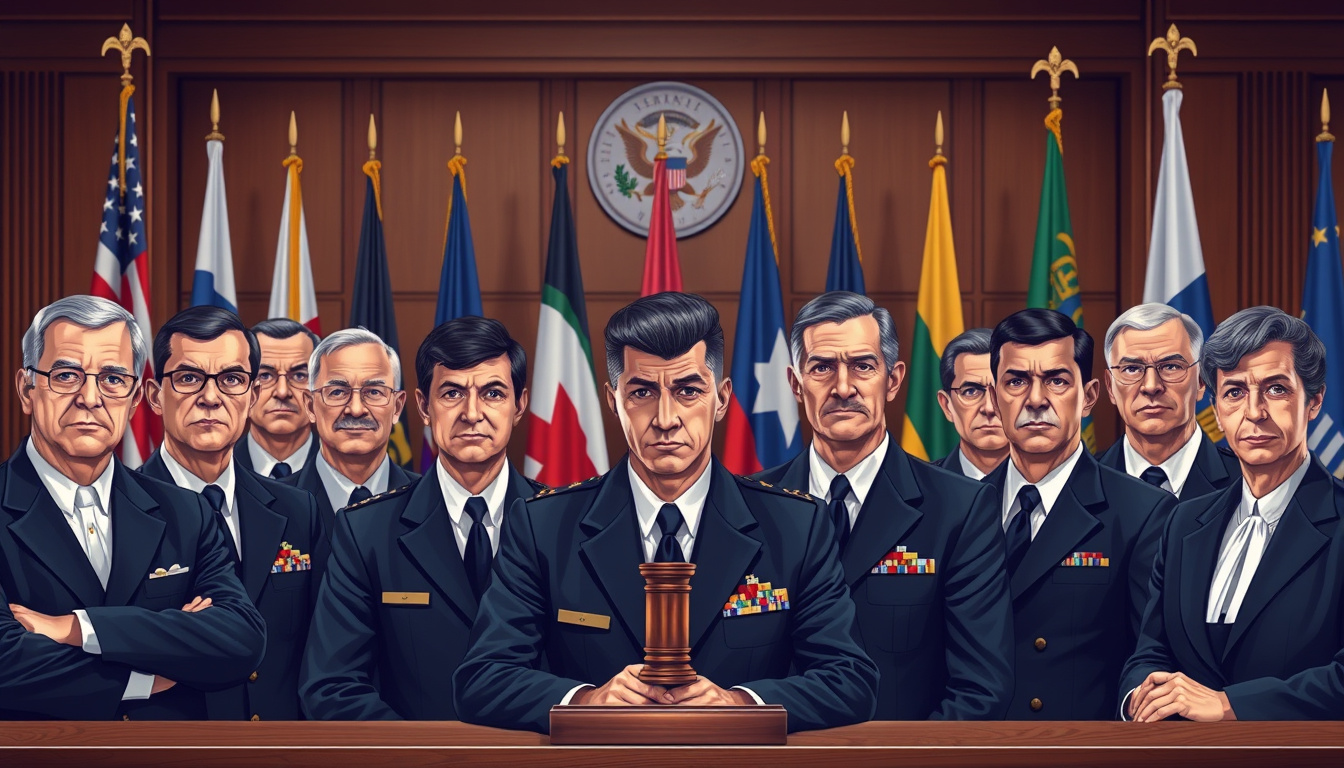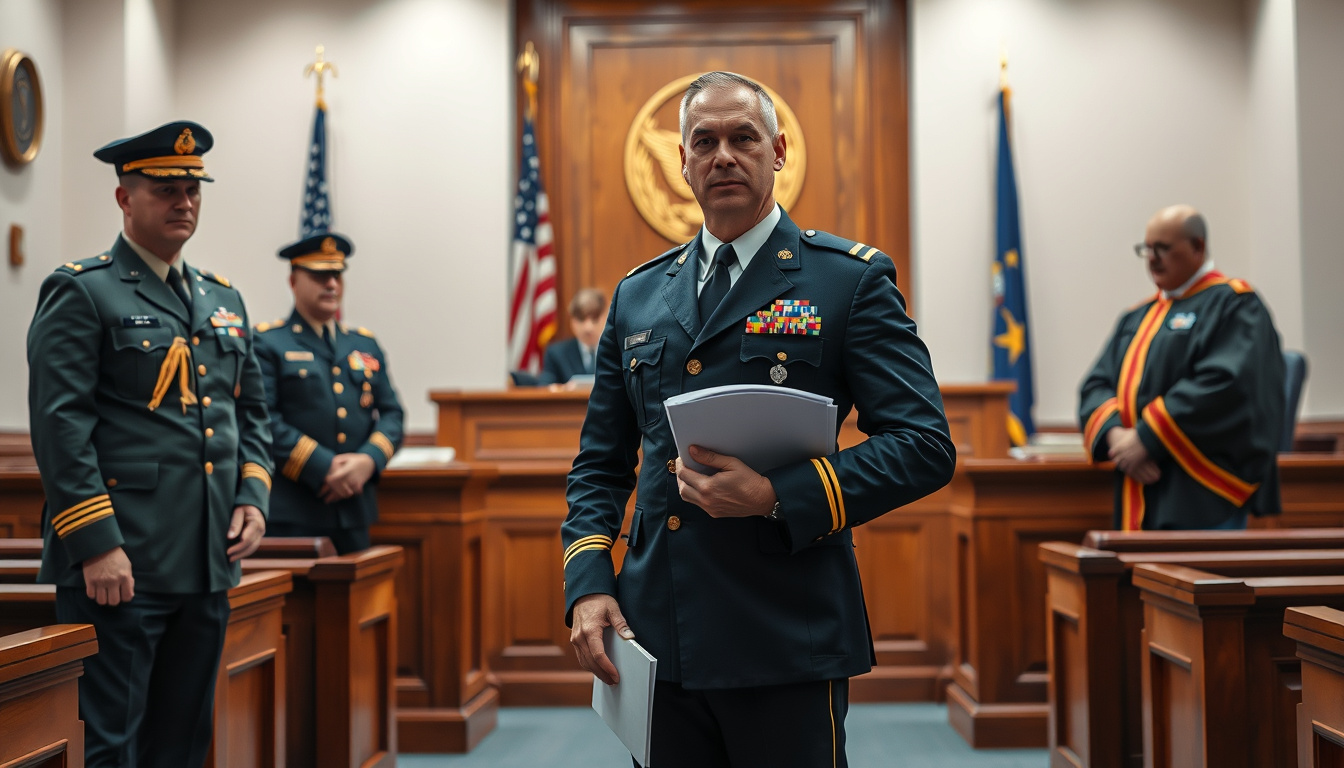Facing legal challenges as a military servicemember is a daunting experience that can lead to severe consequences, including the potential for a court martial.
Court martial attorneys play a critical role in navigating the complexities of military law, defending your rights, and ensuring that service members receive fair treatment in the judicial process.
This article will delve into the intricacies of court martial proceedings, the various types of court martials, the vital role of court martial attorneys, and strategic defenses that can be employed to protect servicemembers and their families in the face of criminal allegations.
Whether you’re dealing with administrative separation, disciplinary actions, or other legal troubles in the military, understanding these elements is crucial for safeguarding your future.

Key Takeaways
- Court martial attorneys specialize in defending military personnel accused of offenses under military law.
- There are three types of court martial: summary, special, and general, each with varying levels of severity and procedures.
- Court martial attorneys are responsible for protecting the rights of their clients and ensuring a fair trial process.
- Key strategies employed by court martial attorneys include gathering evidence, cross-examining witnesses, and formulating a strong defense.
- Legal representation is crucial in court martial cases, as the outcomes can significantly impact a service member’s career and freedom.
Understanding Court Martial: Definition and Purpose
A court martial is a judicial court for trying members of the armed services accused of offenses against military law, specifically the Uniform Code of Military Justice (UCMJ).
Unlike civilian courts, which operate under a different legal framework, court martial proceedings are unique to the military and are designed to enforce discipline and ensure justice within the ranks.
The primary purpose of a court martial is to address serious crimes and violations that threaten the order and operational effectiveness of the military.
Common offenses that may lead to court martial include desertion, theft, assault, and drug-related offenses.
As members of the military face these charges, it becomes crucial for them to seek the expertise of court martial attorneys who are well-versed in military law.
These specialized lawyers play a vital role in providing legal representation, conducting thorough investigations, and assisting servicemembers in navigating the complex legal landscape of military justice.
Understanding the court martial process is essential for servicemembers and their families, as it not only impacts the accused individual but also has broader implications for their careers and family life.
Types of Court Martial: Summary, Special, and General
When a military servicemember faces serious charges, they may find themselves navigating the complexities of a court martial.
Understanding the types of court martial—summary, special, and general—is crucial for servicemembers and their families, particularly when it comes to seeking the guidance of experienced court martial attorneys.
Each type of court martial serves different purposes and involves various procedures.
Summary Court Martial is the least severe of the three and is typically reserved for minor offenses.
This type of court martial is presided over by a single officer who acts as the judge.
The proceedings are relatively informal, and the focus is on quickly resolving lesser disciplinary issues.
When facing a summary court martial, the maximum punishment is limited; for instance, confinement cannot exceed 30 days, and a servicemember may also face rank reduction.
Because of the limited potential consequences, it is important for individuals to understand that even in these cases, having qualified court martial attorneys can help ensure that their rights are protected and that they receive a fair process.
Special Court Martial is a step up in severity and allows for a broader range of offenses to be tried, including some that may lead to a bad conduct discharge.
Special courts martial consist of a panel of officers (or a military judge) and permits a wider array of penalties.
This might include confinement for up to one year, a reduction in pay grade, or a bad conduct discharge.
As the stakes are significantly higher in a special court martial, the importance of facing these charges with the support of seasoned court martial attorneys cannot be understated.
They can provide crucial assistance in navigating the specific procedures and defenses available to servicemembers.
The most serious of the three is the General Court Martial, reserved for the most serious offenses that could lead to a dishonorable discharge or confinement for more than one year.
Cases involving felonies, such as sexual assault or homicide, may be presented before a general court martial.
Here, the accused has the right to a panel of military members (or a military judge alone) to hear the case, and proceedings are formal, similar to a civilian criminal court.
Given the serious ramifications a general court martial can impose, it is essential for servicemembers facing such charges to engage competent court martial attorneys who can strategize their defense and protect their legal rights effectively.
‘Injustice anywhere is a threat to justice everywhere.’ – Martin Luther King Jr.

The Role of a Court Martial Attorney: Responsibilities and Duties
When military servicemembers face allegations that could lead to a court-martial, hiring experienced court martial attorneys becomes crucial for ensuring their rights are protected and for navigating the complexities of military justice.
The primary responsibility of court martial attorneys is to provide legal representation and strategic counsel throughout the entire process, starting from pretrial investigations to actual court hearings and potential appeals.
These attorneys are well-versed in the Uniform Code of Military Justice (UCMJ), ensuring that they can effectively challenge the evidence presented against their clients or advocate for a favorable resolution.
One significant duty of court martial attorneys is to conduct thorough investigations.
This includes gathering evidence, interviewing witnesses, and analyzing the actions of the military personnel involved to ascertain the best defense strategy.
They must also prepare their clients for testimonies and ensure they fully understand the legal proceedings they are facing.
Additionally, court martial attorneys are responsible for negotiating plea deals when appropriate, which can significantly mitigate the consequences of a possible conviction.
Moreover, court martial attorneys must keep their clients informed on every aspect of the case, ensuring that servicemembers and their families understand what’s at stake and what options are available.
Given that military cases can often involve unique issues, such as the effects of PTSD or combat-related stress, skilled attorneys are also equipped to address these factors during trials.
Ultimately, the role of court martial attorneys is not only to defend their clients but also to offer guidance and support during what can be a highly stressful experience.
Navigating the Court Martial Process: Steps Involved
Navigating the court martial process can be a daunting experience for military servicemembers and their families, especially if they are facing serious charges or administrative actions that could impact their careers and lives.
One of the most important steps in this process is engaging court martial attorneys who specialize in military law.
These legal professionals possess the knowledge and experience necessary to guide you through the intricacies of the Uniform Code of Military Justice (UCMJ) and advocate on your behalf.
The first step is to understand the allegations against you and the potential consequences they may have.
This often involves reviewing the evidence gathered by the prosecution and identifying any weaknesses in their case.
Next, your attorney will assist in preparing your defense strategy, whether that be through plea negotiations or preparing for trial.
Court martial hearings typically involve several phases, including pre-trial motions, the trial itself, and post-trial motions, each requiring careful navigation.
Throughout this process, court martial attorneys play a crucial role in ensuring the rights of servicemembers are protected and that they receive a fair trial.
By having experienced legal counsel by your side, you can take informed steps in addressing the charges against you, mitigating potential consequences, and understanding the appeals process if necessary.

Defending Your Rights: Key Strategies Employed by Court Martial Attorneys
Navigating the complexities of military law can be daunting, especially when facing a court martial or administrative separation.
In such challenging times, having knowledgeable court martial attorneys is crucial.
These professionals are trained to defend your rights and ensure that you receive a fair trial.
One of the key strategies employed by court martial attorneys is to conduct a thorough investigation into the allegations against you.
This includes gathering evidence, interviewing witnesses, and scrutinizing the details of the case to identify any inconsistencies or weaknesses in the prosecution’s argument.
Furthermore, they often leverage their understanding of the Uniform Code of Military Justice (UCMJ) to find potential defenses that may exonerate their client or reduce the severity of the charges.
Another vital strategy is the creation of a solid defense plan tailored to the specifics of your case.
Court martial attorneys work closely with their clients to develop a narrative that highlights their strengths and demonstrates any mitigating factors.
This approach not only helps in court but can also ease the anxiety of the servicemember and their family during such trying times.
Additionally, experienced court martial attorneys will engage in negotiations with military prosecutors, seeking plea deals or alternative resolutions that can prevent a court martial altogether.
In summary, having adept court martial attorneys by your side can significantly influence the outcome of your case, providing you the best possible chance to protect your military career and personal reputation.
Common Charges in Court Martial Cases: An Overview
When military servicemembers and their families face the daunting reality of a court martial, understanding the common charges can be a crucial first step in navigating the legal system.
Court martial attorneys play a pivotal role in ensuring that the rights of the accused are defended and that they receive a fair trial.
The types of charges that can lead to court martial proceedings are diverse and can range from minor offenses to serious criminal allegations.
Some of the most common charges encountered include Article 86 (Absence Without Leave), Article 87 (Missing Movement), and Article 15 (Non-Judicial Punishment).
Additionally, more serious charges can involve Article 120 (Rape and Sexual Assault), Article 121 (Larceny), and drug-related offenses under Article 112a.
Each of these charges has its own legal implications and potential consequences, which can include significant penalties such as a dishonorable discharge, confinement, or even a felony conviction.
As servicemembers face the potential of administrative discipline or administrative separation, it becomes increasingly important to engage with experienced court martial attorneys to mitigate the impact on one’s military career and personal life.
These attorneys can help decipher the nuances of the Uniform Code of Military Justice (UCMJ), provide insight into the evidentiary standards required for prosecution, and guide families through the emotional turmoil that accompanies such proceedings.
Understanding the landscape of court martial charges is the first step in formulating a robust defense and preserving the future of both the servicemember and their loved ones.
, the stakes are incredibly high for military servicemembers and their families.</p>
<p>The potential consequences of a court martial range from a variety of penalties, including loss of rank, pay forfeiture, discharge from the military, or even incarceration.</p>
<p>Given the complexities of military law, the importance of having experienced court martial attorneys cannot be overstated.</p>
<p>These legal professionals specialize in military justice and understand the nuances of the UCMJ, ensuring that their clients receive fair representation and the best possible outcome.</p>
<p>With a deep knowledge of court procedures, potential defenses, and the ability to navigate the military’s often intimidating legal landscape, court martial attorneys play a critical role in protecting the rights and reputations of servicemembers.</p>
<p>Their expertise not only aids in developing an effective defense strategy but also provides much-needed support to both the servicemember and their family throughout this challenging process.</p>
<h2>Frequently Asked Questions</h2>
<h3>What is the purpose of a court martial?</h3>
<p>A court martial is a military court designed to try members of the armed forces for offenses outlined in the Uniform Code of Military Justice (UCMJ).</p>
<p>Its purpose is to uphold military discipline and justice, ensuring that service members are held accountable for their actions.</p>
<h3>What types of court martial exist?</h3>
<p>There are three types of court martial: Summary Court Martial, which handles minor offenses; Special Court Martial, for intermediate offenses; and General Court Martial, which deals with the most serious crimes, including felonies.</p>
<h3>What are the responsibilities of a court martial attorney?</h3>
<p>Court martial attorneys are responsible for providing legal representation to service members facing charges, advising them on their rights, developing defense strategies, presenting evidence and arguments at trial, and navigating the court martial process to ensure a fair trial.</p>
<h3>What steps are involved in the court martial process?</h3>
<p>The court martial process typically involves several steps: investigation of the alleged offense, the formal charge and specification filing, pre-trial preparations, the trial itself, and post-trial actions, which may include appeals.</p>
<h3>Why is legal representation important in military justice?</h3>
<p>Legal representation is crucial in military justice as it helps to protect the rights of service members, ensures they receive a fair trial, and increases the chances of a favorable outcome through knowledgeable defense strategies.</p>
<p>If you or a loved one is under investigation or facing charges under the UCMJ, don’t wait to protect your future. Contact <a href=) Gonzalez & Waddington, Attorneys at Law. Our battle-tested military defense lawyers have successfully defended service members worldwide against the most serious military offenses. Call us today for a confidential consultation and put our elite military defense attorneys in your corner.
Gonzalez & Waddington, Attorneys at Law. Our battle-tested military defense lawyers have successfully defended service members worldwide against the most serious military offenses. Call us today for a confidential consultation and put our elite military defense attorneys in your corner.


